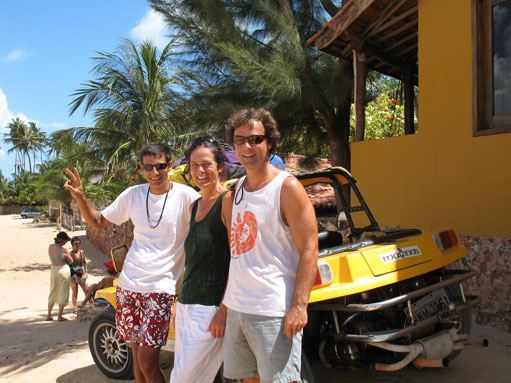
ATLAS e-News
23 February 2011
29 June 2009
Brigitte Epp
Nationality: Austrian

Brigitte Epp and her partner, Toni, hitching a ride with Brazilean Zu.
In early May, Brigitte Epp shared the reactions of many others when the Austrian government announced that it was leaving CERN: “When I read it in the newspapers, first I couldn’t believe it.” Once the bad news proved true, she was glad to witness and take part in “the solidarity in Austria but also abroad. Certainly in Switzerland but all over the world, and I was proud of that.”
Brigitte was among those who signed the online petition to keep Austria a part of CERN, and she felt that the press did an excellent job reporting on efforts to reverse the decision. She views the success of these efforts with pride and relief, as a physicist and Austrian, although physics isn’t her only career.
“Actually, I’m a part-time physicist,” she says. Here on ATLAS, everyone studies particle interactions, but Brigitte spends half her time supporting human interactions as a counsellor.
She works with teams from non-profit organisations, from kindergarten classrooms to hospitals and prisons. “It’s not so much that I give so many advices, but I just help the team to find a solution,” she explains.
Sessions can be calm and focussed, examining the current working situation, identifying the challenges, and clarifying how best to handle them. “Or it can be a ‘boiling conflict’ between team members, which should be solved,” says Brigitte. In either case, it’s up to her to guide discussion and maintain order.
When Brigitte first attended University of Innsbruck, chosen for its mountainous surroundings, she had not planned on being a counsellor or physicist – rather, she intended to teach science and math to students between 10 and 18 years of age. Then, she met Professor Dietmar Kuhn, now head of the University of Innsbruck contingent on ATLAS. She was interested in particle physics, and he hired her to examine the huge rolls of film that recorded bubble chamber interactions.
Brigitte went on to complete her doctorate analysing data from the Rapid Cycling Bubble Chamber of the European Hybrid Spectrometer. “These were the times we had the small collaborations. I remember once organising a meeting in Innsbruck – 25 people,” she recalls. “Really, everyone knew everyone.”
After earning her doctorate, Brigitte returned to her original plan, teaching at Innsbruck’s Akademisches Gymnasium. “The seven years when I was teaching at school, I really found out that I like working with people,” she says. She enjoyed the liveliness of the environment, the constant human interaction, and she missed it when she left. “Many times, as you know, we are working with computers and programs.”
This hole in her professional life led her to begin offering services as a consultant and counsellor to non-profit organisations. She took a three-year course of study to earn her certification.
Brigitte also participates in sports, practicing Tai Chi and Qigong since her early twenties. “It’s health-oriented and some meditative movement,” she describes the slow forms and emphasis on breathing. “It’s more looking inwards.”
For a faster-paced work-out, she enjoys downhill skiing near her home outside Innsbruck. “We are living close to the slope, so actually, I can put on my ski boots and just walk to the lift,” she says. “Yeah, it’s great!”
Her partner of 23 years, Toni, and their son, Nino, also enjoy taking advantage of the mountains. The family engages in rock climbing outings, and Nino took to it so well that he won a few competitions in his early teens. Now in his twenties, he studies environment and bio-resources management – and teaches rock climbing on the side.
Brigitte met Toni at University of Innsbruck, where he was studying to become a medical doctor. He had grown up in the US, but his parents were first-generation Austrian immigrants, so arriving in Austria was a sort of homecoming.
Beyond her two careers and sport activities, Brigitte enjoys long holidays that allow her to experience the culture of places that she visits – at least three weeks and possibly four. She and Toni combined a physics conference outside Rio de Janeiro with a vacation in Brazil in July of 2006.
Toni wanted to spend a week surfing at Jericoacuara, and he and Brigitte got into the habit of eating at a particular beach restaurant. One evening, a man in a dune buggy visited the owner of the restaurant, his friend. Says Brigitte: “He offered us a ride to the next town, and on the way there, he showed us beautiful spots along the endless beaches and invited us to stay at his house.”
His hometown was the village of Maceo. Without electricity or modern media, human interaction took up a noticeably larger portion of the day. However, this was not easy – Toni and Brigitte know only a few basic phrases in Portuguese. “Somehow, you manage like we did as kids,” she says, “with arms and face expressions, and then you pick up the dictionary and look up what you want to say.”
Nevertheless, she and Toni liked the village and company so well that they stayed for a week and returned once more before they returned to Austria.
Brigitte certainly isn’t afraid to take a chance and get involved in something new.

Katie McAlpineATLAS e-News
|